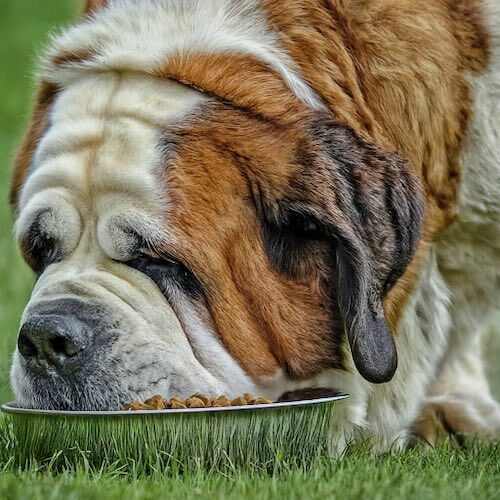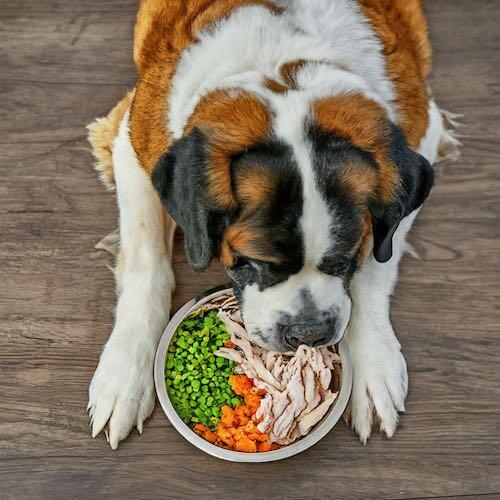The Best Diet for Senior Saint Bernards: Nourishing Your Aging Gentle Giant
Aging Saint Bernards experience significant physiological changes that impact their health, activity levels, and nutritional needs. Renowned for their noble stature and compassionate nature, these gentle giants start to show signs of aging around six to seven years old. As they transition into their golden years, adapting their diet becomes crucial to counteract the effects of aging and to support their diminishing energy levels, slower metabolism, and potential medical conditions such as arthritis, heart issues, or obesity.
Understanding these changes and their impact on the dog’s body is key to a healthy diet for senior Saint Bernards. For example, a common issue is the decrease in muscle mass, necessitating a diet rich in quality protein to maintain muscle health. Additionally, their digestive system may become less efficient, highlighting the need for more easily digestible foods and an increase in certain types of fiber. With the increased risk of chronic illnesses with age, it’s essential to focus on diets that bolster heart health, joint health, and overall immune function.
Search: Best Selling Senior Saint Bernard Dog Foods
This tailored approach to nutrition can significantly enhance an aging Saint Bernard’s quality of life, helping them to remain dignified, content, and healthy for as long as possible. By carefully selecting the right foods and adjusting portions to meet their changing needs, owners can play a pivotal role in managing their senior Saint Bernard’s health. This article provides a comprehensive guide to the best dietary practices for aging Saint Bernards, ensuring they continue to thrive throughout their senior years.
Understanding Aging in Saint Bernards
The transition into seniority marks a critical phase in a Saint Bernard’s life, demanding increased attention to their diet and nutrition. This period introduces significant shifts in their physical condition and metabolic functions, affecting their overall well-being.
Joint issues like arthritis become more common, causing discomfort and reduced mobility. This reduction in activity can lead to weight gain, further straining their large joints and potentially leading to other health complications such as diabetes or heart disease. Moreover, their metabolic rate naturally declines, making it imperative to adjust their caloric intake to prevent obesity.
Proactively managing an aging Saint Bernard’s health through diet is crucial. A diet lower in calories yet rich in essential nutrients can help manage weight and support joint health. Incorporating antioxidants and omega-3 fatty acids is increasingly important to counteract inflammation and aid cognitive function. Adjusting the texture and form of their food can also improve digestion and ensure they continue to enjoy their meals. By recognizing the signs of aging and adapting the diet accordingly, owners can greatly contribute to their pet’s health and happiness in their later years.
Read More: Top 10 Best Rated Dog Food Brands for Saint Bernards
Nutritional Needs of Aging Saint Bernards
Reduced Calorie Intake
With a slowing metabolism, aging Saint Bernards require fewer calories to avoid obesity, which can exacerbate conditions like arthritis and heart disease.
Increased Protein
Maintaining muscle mass is crucial, necessitating a diet with high-quality protein. It’s important to balance protein intake to avoid stressing the kidneys.
Essential Fatty Acids
Omega-3 fatty acids, often found in fish oil, are vital for joint health, helping to reduce inflammation and alleviate symptoms of arthritis.
Fiber
A fiber-rich diet is essential for weight management and digestive health. It’s also beneficial for Saint Bernards with diabetes by helping to regulate blood sugar levels.
Vitamins and Minerals
Increased levels of vitamins E and C, which have antioxidant properties, and minerals like calcium and phosphorus, are important for bone health in senior Saint Bernards.
Recommended Foods for Aging Saint Bernards
When it comes to nourishing a senior Saint Bernard, it’s crucial to focus on foods that cater to their aging bodies, taking into account their slower metabolism, potential joint issues, and the need for enhanced digestive support. High-quality senior dog food formulas specifically designed for large breeds provide a solid foundation. These foods typically contain a careful balance of nutrients, including adjusted levels of protein to support lean muscle mass without overburdening the kidneys, and increased fiber content to aid in digestion.
The addition of fresh, whole foods to your Saint Bernard’s diet can significantly enhance their overall health. Ingredients such as blueberries and pumpkin can offer natural sources of vitamins and antioxidants, supporting cellular health and potentially warding off chronic diseases. Cooked or raw (following safe handling practices) vegetables can add variety and extra fiber, helping to maintain healthy bowel movements and weight. When incorporating fresh foods, it’s important to introduce them slowly to prevent digestive upset.
For senior Saint Bernards, maintaining a healthy weight is paramount. Obesity can exacerbate joint problems and lead to other health issues. Low-calorie, nutrient-dense foods that satisfy without adding excess weight are ideal. Small, frequent meals can also help in managing weight while ensuring that your dog gets the nutrition they need throughout the day.
Joint health is a common concern for large breed dogs, especially as they age. Foods that are rich in omega-3 fatty acids, such as fish and flaxseed, can support joint health and mobility. Additionally, senior dog foods that include joint-supporting supplements like glucosamine and chondroitin can provide targeted nutritional support to maintain joint health and mobility.
Finally, hydration is incredibly important for senior Saint Bernards. Ensuring access to fresh, clean water at all times is a must. Wet food can also contribute to hydration and may be more palatable for older dogs that have lost some of their sense of smell and taste. Regular veterinary check-ups can help you tailor your dog’s diet to their evolving needs, ensuring they receive the best possible care in their golden years. By choosing the right foods and supplements, you can significantly impact your senior Saint Bernard’s quality of life, helping them enjoy their senior years with vigor and health.
Read More: Top 10 Best Senior Dog Food Brands
Foods to Avoid
Certain foods are detrimental to aging Saint Bernards, including those high in fat and sodium, which can lead to weight gain and heart issues. Toxic foods for dogs, such as chocolate, grapes, onions, and those containing xylitol, must be avoided. Avocados, macadamia nuts, alcohol, and caffeinated drinks also pose serious health risks, from digestive upset to severe nervous system damage.
Maintaining a strict diet free of harmful foods is particularly important for aging Saint Bernards with sensitive digestive systems or existing health concerns. Consulting with a veterinarian can provide guidance and confidence in establishing the safest, most nutritious diet for your senior pet.
Feeding Schedule and Portion Control
Maintaining a consistent feeding schedule and controlling portions are crucial strategies in managing the health and wellbeing of senior Saint Bernards. As these gentle giants age, their metabolic rate tends to slow down, necessitating adjustments to their diet to prevent weight gain and associated health complications. Implementing smaller, more frequent meals can significantly benefit their older digestive systems, ensuring nutrients are absorbed more efficiently and helping to maintain stable energy levels throughout the day. This approach also aids in preventing the bloating and digestive discomfort that can occur from larger meals, which is particularly important in large breeds prone to gastric issues.
Furthermore, careful portion control is imperative to meet the reduced caloric needs of aging Saint Bernards without compromising on the essential nutrients they require. Senior dogs have a delicate balance to maintain: they need enough protein to support muscle mass, yet their overall caloric intake must be managed to avoid obesity. Obesity in senior dogs can lead to a host of health problems, including diabetes, heart disease, and exacerbated joint issues, all of which can significantly diminish their quality of life.
In addition to tailored meal plans, ensuring these meals are composed of high-quality, senior-specific dog food that includes all necessary nutrients for an aging dog is key. Ingredients should be carefully selected to support joint health, cognitive function, and overall organ health, with a particular focus on natural, whole-food sources of vitamins and minerals. Foods enriched with omega-3 fatty acids, antioxidants, and fiber can support these health areas while also catering to the taste preferences of older dogs, who may become more selective with their food.
Special Considerations
Addressing individual health issues and enhancing meal palatability are important considerations for the diet of an aging Saint Bernard. Customizing the diet to manage specific conditions like kidney disease or heart problems, under veterinary guidance, can significantly improve their quality of life. Making food more appealing by warming it or adding flavorful enhancements can encourage eating, ensuring they receive the nutrients needed despite a decreased sense of smell and taste.
Conclusion
As Saint Bernards transition into their senior years, their dietary needs change, requiring owners to adjust their feeding practices accordingly. A balanced diet, tailored to their specific needs, is key to managing age-related conditions and enhancing their quality of life. Regular veterinary consultations offer invaluable tailored nutritional advice, ensuring your aging Saint Bernard continues to thrive.
Consultation with a Veterinarian
Before implementing any significant dietary changes, consulting with a veterinarian is crucial. They can provide personalized advice based on your Saint Bernard’s health status, dietary needs, and any existing medical conditions, ensuring a nutrition plan that best supports their health and well-being in their senior years.




